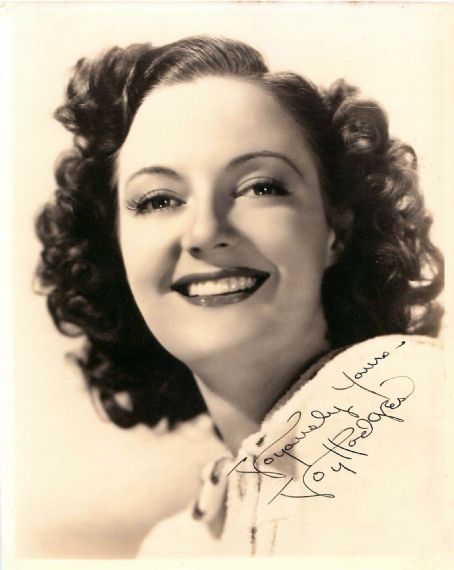Joy Hodges (Joy Hodges)

Actress, Singer. A noted stage, screen, and Big Band artist, Joy Hodges may perhaps be best remembered for helping a young Midwestern sportscaster break into Hollywood. Born Frances Eloise Hodges, she was raised in Des Moines, got her start in show business at 11 as half of the Bluebird Twins, and while a student at East High School performed with the Crooning Coeds. While a singer on Des Moines’ WHO radio, she struck-up a friendship with the station’s sports announcer, Ronald Reagan, that was to have implications in later years; after winning a local talent contest, Joy got her Big Band start in Chicago and over the years was to tour with Ozzie Nelson and other top orchestra leaders of the day. While continuing her musical work, she signed an RKO contract in 1935 and that same year made her silver screen bow in the short feature “A Night at the Biltmore Bowl”. She was seen in 1935’s “To Beat the Band” and the 1936 Fred Astaire and Ginger Rogers hit “Follow the Fleet”, then in 1937 landed the Broadway role of Miss Jones in George M. Cohan’s “I’d Rather Be Right”, her big number “Have You Met Miss Jones?” for a time the most popular song in America. Also in 1937, Reagan looked her up when he was in California covering spring training for the Chicago Cubs and asked her about his chances of getting into acting; Joy put him in touch with her agent who was able to land him a $200 per week Warner Brothers contract, thus launching him on a path that ended at 1600 Pennsylvania Avenue. Joy co-starred opposite Vincent Price in his 1939 film debut, “Service de Luxe”, and during World War II served with the USO, traveling to combat zones with Harry James and Glenn Miller, then after the conflict was seen on Broadway in such fare as “Best Foot Forward” and “Nellie Bly”. Thru the 1950s, she appeared on the big screen on a number of occasions as well as on such television shows of the time as “China Smith”, “Armstrong Circle Theatre”, “Robert Montgomery Presents”, and “The Millionaire”. She earned her 1963 final screen credits in the movie “Bell, Bare and Beautiful” and an episode of “Perry Mason”, but kept up her stage work, replacing Ruby Keeler in the 1972 run of “No, No, Nanette” and taking her 1985 last bow on the Great White Way in “Babes in Arms”. Joy had two failed early marriages, the first to Gilbert Doorly leaving her with large blocks of Mercedes Benz and Disney stock which she used as gifts over the years, though her final union to businessman Eugene Scheiss, during which she resided in the upscale New York suburb of Katonah, lasted until Mr. Scheiss’ 1988 death. During the Reagan Presidency, she was a frequent White House guest, on one occasion providing a line which The Gipper was to use to great advantage when she turned to Soviet President Gorbachev at a State Dinner and said “Gorby, take down that wall”. Joy lived her last 10 years in Palm Springs, participated in the 2000 documentary “I Used To Be in Pictures”, last visited President Reagan in 2001, and died of pneumonia and the complications of advanced age. A few of her performances are preserved on DVD; some sources give birth year as 1914. (bio by: Bob Hufford) Family links: Spouse: Gilbert Hitchcock Doorly (1907 – 1965)
Born
- January, 29, 1915
- USA
- Des Moines, Iowa
Died
- January, 01, 2003
- USA
- Palm Desert, California
Cause of Death
- pneumonia
Cemetery
- Masonic Cemetery
- Des Moines, Iowa
- USA



